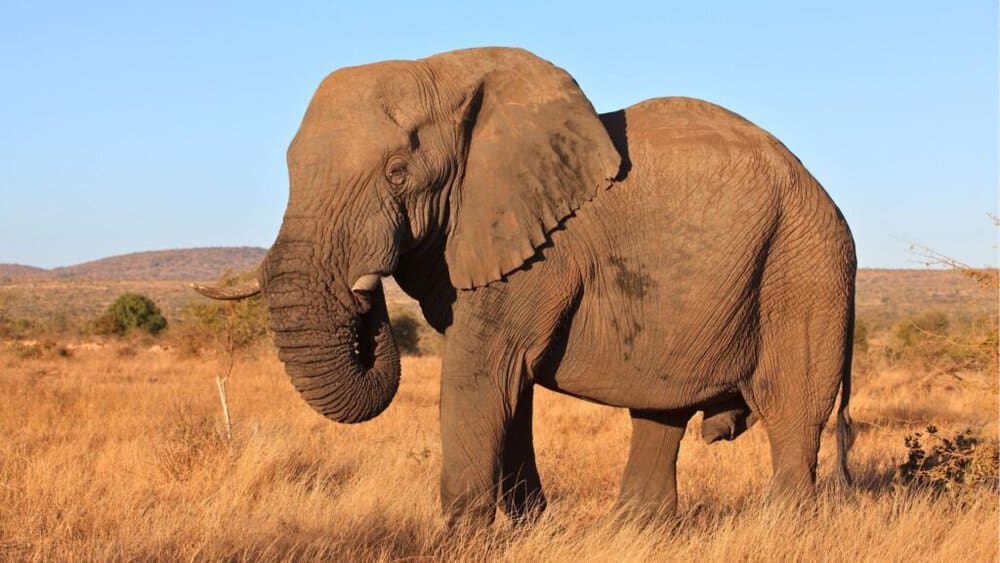In Zambia’s South Luangwa National Park, a delightful family of elephants showcases their loving nature.
The family includes two doting parents who tolerate their playful baby and actively join in his fun.
Watch the video at the end.
Their interactions highlight their affection and commitment to protecting and enjoying time with their calf.

Elephants are known for their strong family bonds and cooperative care within herds. In this case, the elephant parents and their lively young calf are a perfect example. Full of energy, the calf is often seen frolicking and playing on the savannah.
His mother, who shares his playful spirit, engages in his antics, stepping on him as he rolls around.

This heartwarming scene demonstrates the depth of their parental love, akin to human families.
What do elephants symbolize?

Elephants embody a rich tapestry of symbolism across cultures and traditions. They are often associated with strength, wisdom, and good fortune. Their large size and gentle nature represent a harmonious blend of power and compassion.
In many cultures, elephants are revered as symbols of royalty and leadership. Their dignified presence and matriarchal social structure reinforce this association. Additionally, thanks to their impressive cognitive abilities and long lifespans, elephants are often linked to memory and longevity.
The symbolism of elephants can also extend to concepts such as protection, loyalty, and family. Their strong familial bonds and protective instincts resonate with people around the world. Furthermore, elephants are sometimes seen as symbols of luck and prosperity, particularly in some Asian cultures where they are often depicted with raised trunks, signifying good fortune.
How long can elephants live?

Elephants are known for their long lifespans. In the wild, they can live for 50 to 70 years; some individuals have even been recorded living into their 80s. However, the lifespan of elephants in captivity is often shorter, with many not reaching 40 years of age. This difference is due to various factors, including the quality of care, diet, and exercise opportunities available to captive elephants.
How much does an elephant weigh?

Elephants, the largest land animals, vary in weight by species and age. African elephants can weigh between 5,000 to 14,000 pounds (2,268 to 6,350 kilograms), with males generally heavier than females. Asian elephants are smaller, with males weighing 4,500 to 11,000 pounds (2,041 to 4,990 kilograms) and females between 3,000 to 6,000 pounds (1,361 to 2,722 kilograms).
How long are elephants pregnant?

Elephants have one of the longest gestation periods among mammals, lasting between 18 to 22 months. African elephants typically have a gestation period of about 22 months, while Asian elephants are pregnant for about 18 to 22 months. This lengthy pregnancy allows the calf to develop fully, ensuring it is relatively mature and can walk soon after birth.
How long do elephants live?

Elephants are known for their long lifespans. In the wild, African elephants typically live between 60 to 70 years, while Asian elephants have a lifespan of about 48 to 60 years. In captivity, elephants may live longer due to regular veterinary care and the absence of predators, although their longevity can vary based on living conditions.
What do elephants eat?

Elephants are herbivores and primarily eat plant-based foods. Their diet includes grasses, leaves, bark, fruits, and roots. African elephants tend to consume more grass, while Asian elephants eat more woody plants. An adult elephant can eat up to 300 pounds (136 kilograms) of food each day.
Where do elephants live?

Elephants live in various habitats across Africa and Asia. In sub-Saharan Africa, African elephants inhabit savannas, forests, deserts, and marshes, including countries like Kenya, Tanzania, Botswana, and South Africa. Asian elephants are found in forests, grasslands, and scrublands across 13 South and Southeast Asian countries, including India, Sri Lanka, Thailand, and Indonesia. Their habitats range from dense tropical forests to open grasslands, depending on the availability of food and water.
Are elephants afraid of mice?

The idea that elephants are afraid of mice is a popular myth with no scientific backing. Elephants have poor eyesight, making it unlikely they would even notice a small mouse. Any reactions to sudden movements are more likely due to surprise rather than fear of the mouse. Elephants are primarily concerned with larger threats, such as predators or humans.
Are elephants endangered?

Elephants are considered endangered. The International Union for Conservation of Nature (IUCN) lists African elephants as vulnerable, while forest elephants, a subspecies, are critically endangered. Asian elephants are classified as endangered. Major threats include habitat loss, human-wildlife conflict, and poaching for ivory.
Do female elephants have tusks?

In African elephants, both males and females typically have tusks. In contrast, in Asian elephants, only some males have tusks, while females usually do not. Female Asian elephants may have small tusk-like structures called tushes, often not visible outside the mouth.





